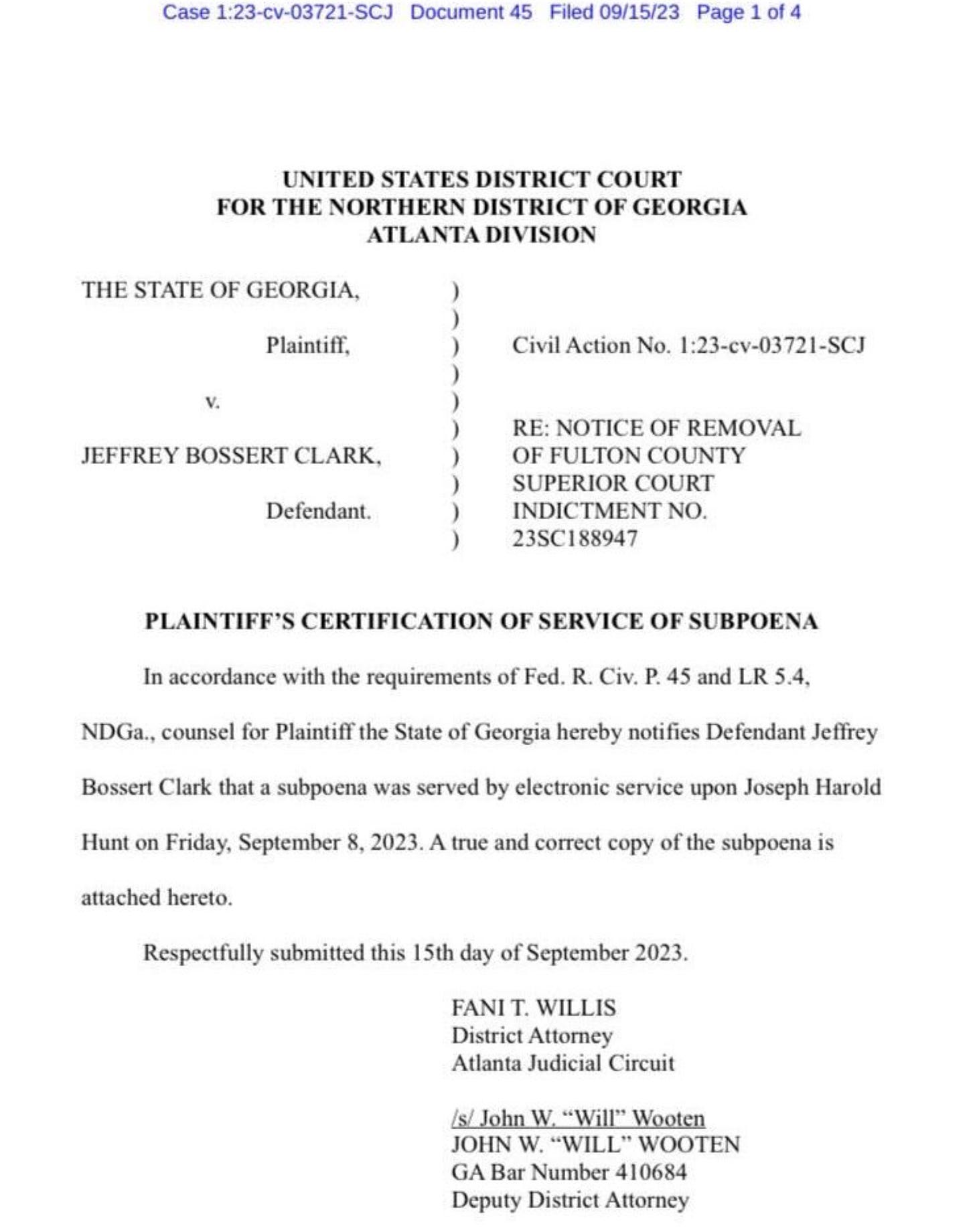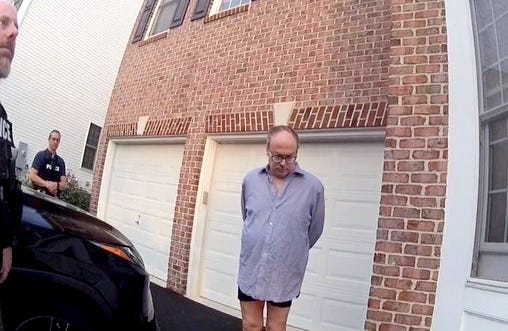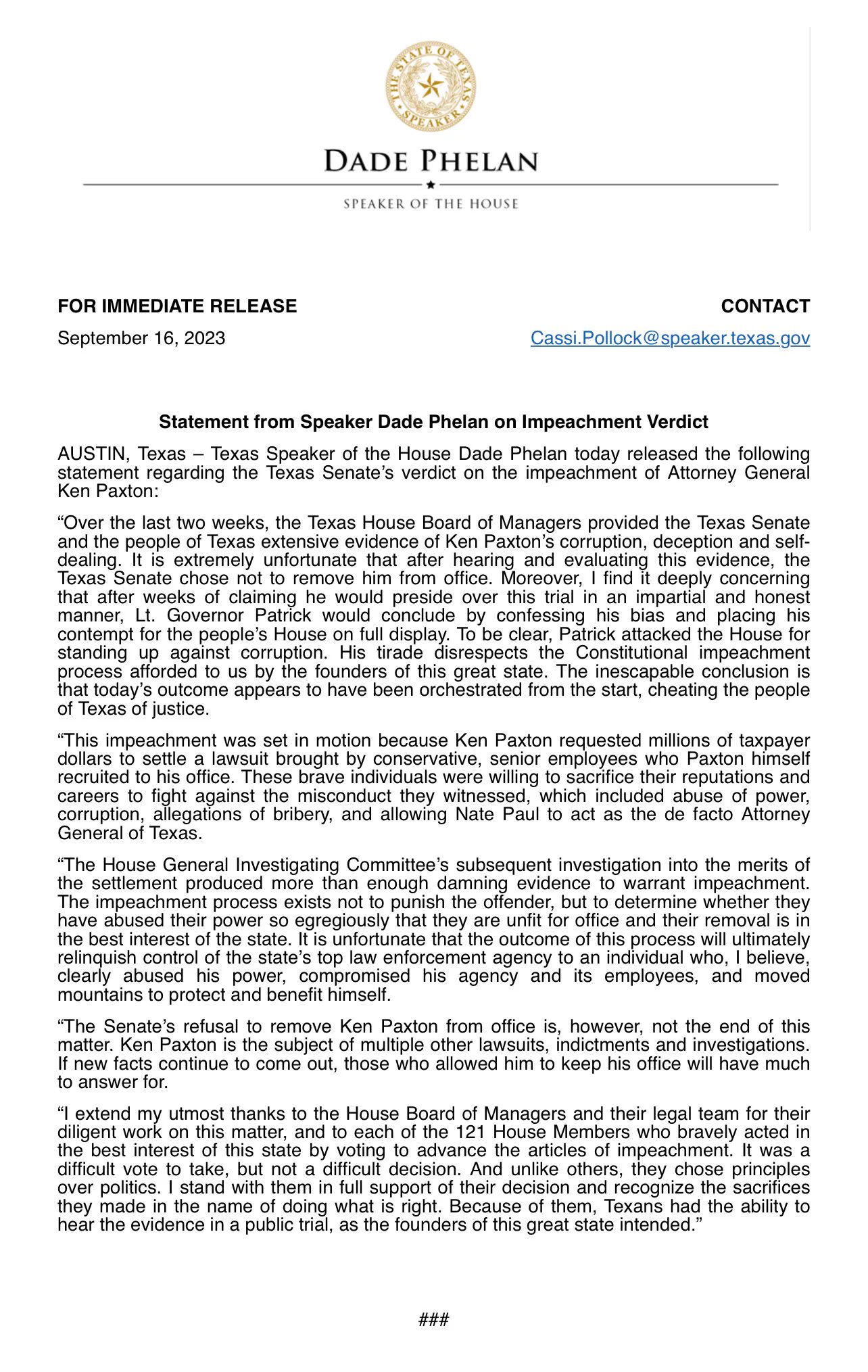On Monday, former Assistant Attorney General for DOJ’s Environment and Natural Resources Division (ENRD), Jeff Clark, will get a hearing on his motion to remove his prosecution from state court in Georgia to federal court. As you can see from a quick look at ENRD’s website, that Division at DOJ has absolutely nothing to do with elections or voting fraud. Instead, Clark will likely argue that he is charged with conduct he carried out as part of his official duties stemming from his role as the acting head of the Civil Division at the end of the Trump administration.
A reminder: Clark must show he was carrying out official duties when he engaged in the conduct he is charged with to be entitled to remove his case from state to federal court.
Clark became the acting head of the Civil Division in September of 2020. Fulton County DA Fani Willis has subpoenaed his predecessor, Jody Hunt, to testify. Most likely, that’s because Willis intends to elicit testimony from Hunt to establish that the head of DOJ’s Civil Division does not, as part of his official duties, have authority to feed bogus information to states about voting fraud. Nor can he negotiate side deals with the president to take over the Justice Department in order to push a false voter fraud narrative.
Here’s what DOJ’s website says about the Civil Division’s authority: “The…Civil Division represents the United States, its departments and agencies, Members of Congress, Cabinet Officers, and other federal employees in any civil or criminal matter within its scope of responsibility. The Civil Division’s responsibilities include defending against challenges to federal programs; ensuring the Federal Government speaks with one voice in its view of the law; preserving the intent of Congress; advancing the credibility of the government before the courts; and protecting the public fisc (the U.S. Treasury).” As you can see, its mission does not include declaring elections fraudulent. Nor does the listing of program areas the Civil Division works with aid Clark’s argument.
The Civil Rights Division has a voting section. The Criminal Division has a public integrity section that can look into election fraud. But as the head of the Civil Division, and certainly as the head of the Environment and Natural Resources decisions, Clark was not acting within the scope of his official responsibilities when he joined Trump’s conspiracy.
That makes his removal motion, let alone his defense in the criminal case, an uphill battle. Today, Clark’s attorneys filed an affidavit from 91-year-old former Attorney General Ed Meese, who himself resigned under a cloud following an independent counsel investigation during the Reagan administration, although he was never charged. You can read the 135 page affidavit (most of it is attachments) in full here. Here’s a representative sample of the argument. Meese mischaracterizes Clark’s plot with Trump, as though it’s somehow merely an innocuous discussion of policy. He conveniently forgets that DOJ rules make it clear that someone in Clark’s position should not be having conversations with the President outside of his chain of command in the first place. And the appeal to George Wallace, as though the racist Alabama governor had the ability to prosecute Kennedy when he integrated Alabama’s schools, is disingenuous. Nothing of any import here.
It’s unclear whether Clark will testify. It would seem to be a fool’s errand, with Mark Meadows’ disastrous and unavailing turn on the witness stand as a cautionary tale. But Clark has often played the fool here. He was once dismissed by acting Attorney General Jeff Rosen and Deputy Attorney General Richard Donoghue with the insult that they’d call the environmental lawyer when there was an oil spill. They said that when he tried to convince them to join Trump’s conspiracy and push his fake claims of fraud out to certain states under the imprimatur of the Justice Department.
Clark is charged in two counts in the Fulton County Indictment, the RICO conspiracy charge and an attempted false statements charge. Clark, along with unindicted co-conspirators, is alleged to have prepared a document that falsely claimed the Justice Department had identified "significant concerns" that might have affected the outcome of the election in Georgia and other states. Clark repeatedly sought permission from Rosen and Donoghue to send the document to Georgia Governor Brian Kemp and other Georgia officials, in an effort to give them cover for calling the outcome of the vote in that state into question. But they refused.
Clark was introduced to Trump in late December of 2020 by mutual friend, Pennsylvania Republican Representative Scott Perry, according to the January 6 committee report. The report said that, “Clark had told the President that if he were to change the leadership at the Department of Justice, ‘then the Department might be able to do more’ to support the President’s claims that the election had been stolen from him.” What a guy.
After his conversation with Clark, Trump had several conversations with Rosen and Donoghue. He berated them for failing to support his claims of fraud in the Georgia election. Donoghue’s notes reflect that he patiently debunked, line by line, Trump’s claims about suitcases of ballots, dead people voting, etc., during their conversations. The January 6 committee report relates a conversation where Trump continued to push fake claims, and Rosen, while committing to check out the details, “wanted President Trump to ‘understand that the DOJ can’t and won’t snap its fingers and change the outcome of the election. It doesn’t work that way.’ ‘I don’t expect you to do that,’ President Trump responded. ‘Just say the election was corrupt and leave the rest to me and the Republican Congressmen.’”
Mark Meadows had the strongest argument among the defendants for removal and it was not strong enough. He argued that, as chief of staff, he was always acting in his official capacity, even when Trump was off in crazy-town (my characterization, not his). Clark will have to convince a federal judge that his participation in crazy-town was part of his official duties. He should have cut a deal and testified for the government at the first sign of prosecution. But he has bad legal judgment. We may see more of that on full display Monday.
Other defendants including Shawn Still, Kathy Latham, and David Shafer will also argue for removal in federal court this week. The three are among the Georgia slate of fake electors. Still’s motion will be heard on Monday. Latham and Shafer are scheduled on Wednesday. They will have to argue, since they were not public officials, that they were acting under the direct orders of one. They do not appear to allege that Trump himself directed them, but rather they were instructed they were needed to carry out the President’s work in meetings with one or more of his lawyers. The likely upshot is that all defendants will be tried in state court.
Finally, on the removal front, Mark Meadows must file his opening brief with the 11th Circuit, appealing the district court’s denial of his motion to remove his case, on Monday. The court set an expedited briefing schedule, with District Attorney Willis’ brief due the following Monday and Meadows’ reply due later that week. The court could decide the issue without oral argument—the 11th is among the circuits that hear argument in the least number of cases—but they set argument for the emergency motion that Meadows subsequently withdrew, so it would make sense that the court would set argument here as well. The court might combine, for efficiency, Meadows’ appeal with those of the defendants whose cases will be heard in the district court this week, if either side appeals those decisions. In any event, the prospect of being able to hear argument in federal court in real time, or perhaps watch it on Zoom, (which is what the court had scheduled for the emergency motion), is a step forward for transparency in federal courts. But for now, while that’s a feature of appellate arguments in Atlanta, it will not apply in federal district court. We will have to await reporting on Meadows’ hearing and on the others.
***
Also this week, in federal court in Washington D.C., Judge Tanya Chutkan has Trump’s motion, asking her to recuse herself from his case, to decide. Expect her to handle this promptly and thoroughly, but to sidestep his offer to her of an exit from the case. His next move is likely a mandamus petition to the court of appeals, asking them to force her recusal. He is unlikely to win that motion, for reasons we’ve previously discussed.
In his responsive pleading, the special counsel wrote, “Because the defendant’s motion fails to establish any bias by the Court, much less the deep-seated antagonism required for recusal, the Court has a duty to continue to oversee this proceeding.” Read the government’s full brief here. We may watch this play out this week if Trump files his reply.
***
Two weeks ago in The Week Ahead, we discussed the impeachment of Texas Attorney General Ken Paxton. His trial before the Texas Senate continued for nine days. Saturday afternoon, Republican state senators, in a proceeding worthy of Trump’s strategic cynicism and lack of values, refused to convict Paxton.
They said there wasn’t sufficient evidence against Paxton. But that wasn’t the case, according to Republicans in the House who led the committee that impeached him. Republican State Representative Andrew Murr, who led the House prosecution team, argued that Paxton used the state attorney general’s office “to serve himself, not the people of Texas. If you vote to condone that, then high office will simply be the most profitable choice for any self-serving crook."
Axios reported that the acquittal was the result of a secret campaign coordinated by top Trump allies. Their report says that national Republicans “organized an under-the-radar campaign of outside conservative pressure on the Texas senators designed to neutralize mainstream media coverage.” The pressure allegedly came in the form of threats that any GOP senator who voted for impeachment would “face a very well-funded primary opponent in their next election.” Only two Republican senators voted to convict—neither faces reelection until 2026.
According to the report, Trump allies like Steve Bannon and Charlie Kirk used their platforms to support Paxton, with Kirk having “his people posting senators' office numbers and was giving them out on his show. Driving the senators absolutely crazy." It all sounds very Trumpian, and Trump himself, just a few days before the vote, used his social media platform Truth Social to call Paxton "one of the TOUGHEST & BEST Attorney Generals in the Country," congratulating him on a "Texas sized VICTORY" after he prevailed.
Some Texas Republicans are now calling for the Speaker of the Texas House, Dade Phelan, a member of their own party, to resign. They say he should never have led the charge to impeach Paxton. But Phelan persists in his view and maintains that it was the right thing to do.
Phelan accused the Senate of failing to do its job, saying the acquittal “appears to have been orchestrated from the start, cheating the people of Texas of justice.”
There are reports that the FBI appears to be investigating Paxton for the same conduct that led to the impeachment and that a grand jury is investigating. Paxton is still under state indictment for eight-year-old securities fraud charges that he has managed to delay so far with procedural motions.
***
There is a raging debate over the wisdom (or lack thereof) of the media giving Trump a platform without real time fact checking. One things that is for certain is that every time the former president takes up the microphone, he makes prosecutors’ cases against him stronger. This weekend, it was Kristen Welker’s debut hosting Meet the Press on NBC. Trump told Welker that it was his decision to push the (of course, false) claim that he won the election and to try and overturn the results. “It was my decision, but I listened to some people,” he said. So much for any defense that Trump was relying on the advice of counsel.
To convict Trump, both Jack Smith and Fani Willis will have to prove that he knew he lost the 2020 election. January 6 committee reporting revealed that Trump was advised he’d lost by his lawyers, his campaign staff, and his numbers guy, to say nothing of every judge (including ones he’d appointed) who handled his many cases in court. His own appointees at the Department of Homeland Security said the election had not been tainted by fraud and was highly secure. But Trump insisted to Welker that in his mind, it all added up to the conclusion that “the election was rigged.” Trump continued, “You know who I listen to? Myself. I saw what happened.” The case gets stronger every time Trump opens his mouth.
***
Historian Michael Beschloss tweeted this reminder today:
Justice Ketanji Brown Jackson, in her speech commemorating the anniversary of the bombing of 16th Street Baptist Church in Birmingham, Alabama on Friday, said these powerful words, “If we’re going to continue to move forward as a nation we cannot allow concerns about discomfort to displace knowledge, truth or history.”
We’re in this together,
Joyce











Thank you for the wise words from Justice Ketanji Brown Jackson: “If we’re going to continue to move forward as a nation we cannot allow concerns about discomfort to displace knowledge, truth or history.”
Why do so many grown, educated people get all giddy around Trump and become so subservient? I keep feeling he must put out personal threats, beyond running a primary candidate against them. It's like the bully on the playground with his band of miscreants, kicking dust in everyone's face, and his gang are delighted just to be seen with him.